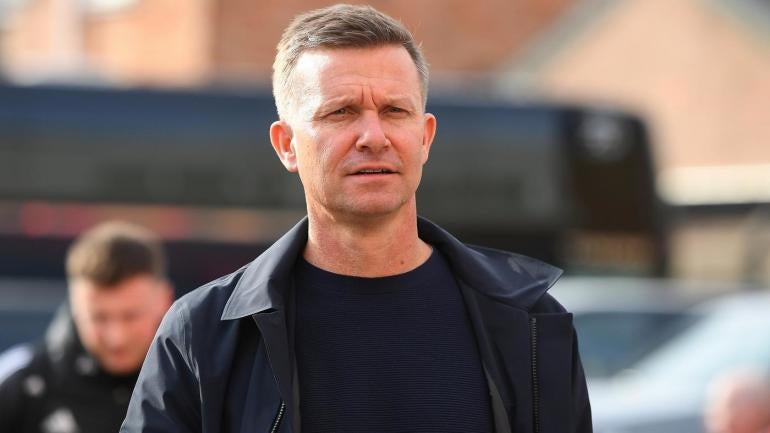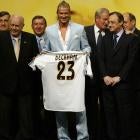
New Canada head coach Jesse Marsch reflected on the process he went through to interview for the U.S. men's national team job a year ago, saying he "wasn't treated very well" by the U.S. Soccer Federation along the way.
Marsch was a candidate for the USMNT job when it was vacant last year, though the federation eventually opted to re-hire Gregg Berhalter after he led the team at the 2022 World Cup. He did not get into specifics but was curt when discussing his interactions with those in charge of the hiring process.
"Obviously growing up in the U.S. and contributing and playing for the national team, playing for the youth national teams, coaching at the World Cup with the U.S. national team, my respect for U.S. Soccer is big," he said on the latest episode of Call It What You Want, a CBS Sports Golazo Network podcast. "But I went through a process with them, right? And I'm not going to go into it but I wasn't treated very well in the process and so whatever, man. That's in the past now and I'm fully focused. The minute it was done, I was like, 'Okay, I'm moving forward and I'm going to figure out what's right for me,' and again, it motivated me again to find the right people."
Marsch stressed that the ideas and the people in place at the Canadian Soccer Association (CSA) aligned with his ideas for the job, which is why he ultimately said yes after going more than a year without a coaching role.
For all the latest on the USMNT and the state of the American game look no further than the Call It What You Want podcast! Download and follow Call It What You Want on Apple Podcasts, Spotify or wherever you get your podcasts!
"Kevin Blue [the CSA CEO and general secretary] comes from college athletics and the recruitment job he did to get me here was second to none," Marsch said. "I've never felt more wanted, more desired and more appreciated, right? And in the end, when it was time to execute getting my contract done, he did it in two days, right? This guy, he has a plan, he knows how to execute it and he knows how to get it done. In this sport, you can't underestimate the value of execution, right, because everyone talks about how they want to do things and can dream big but in the end, it's all about execution and I believe that he and I are going to make a formidable team."
The coach's malcontent with U.S. Soccer also resembles his feelings at different teams. Marsch implied that he turned down several jobs in the last year and change because it did not feel like the right fit, sometimes even at the top levels of the game.
"It's almost like the higher that I went, the more disappointed I was in the way that things operate," the former Leeds United manager said. "People think Leeds is such a big club but you peel the veil away, we were a club that was in disarray when I got there, very, financially, a mess, and it made, then, managing everything very difficult but I decided to take that on and I tried to do the best I could with it."
His recent experiences meant he was very intentional about the job he ultimately ended up taking.
"I don't need to work," Marsch said. "I love to work, but because I love to work, I have to protect, I think, the ways that I think about how to work and who to work with and again, this led me down this road with Canada that made me feel like the people were amazing and the opportunity to actually be able to work and impact things is what inspired me, and people to do it with."
Rivalry with the USMNT
Marsch joins Canada as they ramp up preparations for the 2026 World Cup, a tournament they will co-host with the U.S. and Mexico. The head coach admitted he's excited by the player pool, which includes Bayern Munich's Alphonso Davies and Lille's Jonathan David. It's arguably the most promising group of talent Canada's men's team has ever had but Marsch recognized that they need to prove themselves at the continental level -- and against regional rivals like the USMNT.
"The U.S. is a bit of, right now, the measuring stick in Concacaf," Marsch said. "With the player pool that they have and the players that they have playing at big clubs and the success they've had over the years, the sport's really developed in the U.S., which we should all be very proud of.
"Who knows? I'm sure we'll play the U.S. a few times before the World Cup comes around, so I'll be looking forward to those matches. I think the familiarity with things kind of brings out competitive juices and certainly -- look, the Canadian team has measured itself against the U.S. for years and that won't stop now or be more magnified just because I'm here. I think that, you know, in general, we want to take this program and continue to establish it."
Marsch feels, though, that his job is bigger than just toppling the USMNT in regional battles. He hopes to further the progress of soccer in Canada, where he believes there is still untapped potential.
"For the most part, I felt like being part of this program was going to allow me not only to think about how to impact the first team the most but also the sport in the country and I think there's a more holistic vision for me being the head coach of the Canadian national team than just, 'What are the wins and losses?," he said. "Obviously, I always know that I'll be judged by those things and the success of the first team in the 2026 World Cup will be the most important thing for me to manage but there's so much more than can be done in Canada to help the sport continue to grow and I want to make a real positive impact in that way."





















